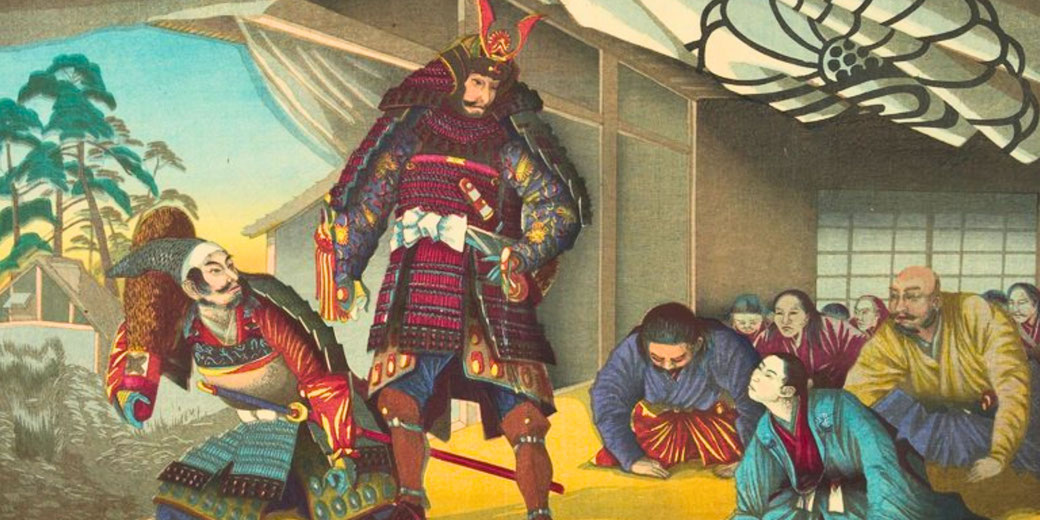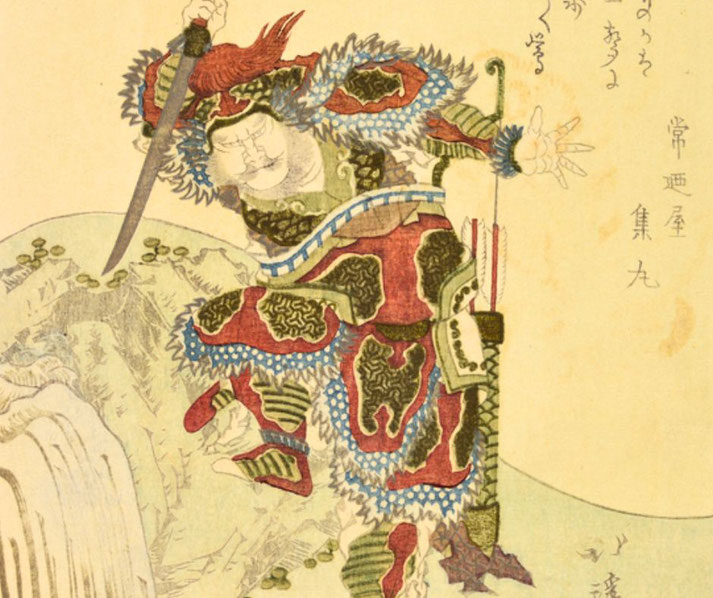What was the ancient warrior philosophy of Bushido?

Bushido, often translated as "the way of the warrior," is a code of conduct and a way of life that has deeply influenced Japanese culture and history.
Originating in the traditions of the samurai, the elite warrior class of feudal Japan, Bushido emphasizes virtues such as honor, loyalty, courage, and self-discipline.
These principles guided the samurai in their martial training, their approach to warfare, and their conduct in everyday life, which became entrenched in their identity and their historical legacy.
The historical development of Bushido
The earliest elements of Bushido date back to the early samurai warriors during Japan's feudal era, around the 12th century.
Initially, these warriors were simply hired swords, but as their influence grew, they developed a distinct code of conduct.
The first recorded mention of Bushido principles appeared in the "Kojiki" and "Nihon Shoki," ancient chronicles detailing Japan's mythological beginnings and early history.
However, it was during the Kamakura period (1185–1333) that Bushido began to take shape, influenced by the rise of the samurai class and the establishment of military governments, known as shogunates.
The Mongol invasions of Japan in 1274 and 1281 played a significant role in shaping Bushido.
The samurai's successful defense against these formidable foes highlighted the importance of loyalty, bravery, and honor in battle.
As the samurai's status elevated, so did the sophistication of Bushido, incorporating elements of Zen Buddhism, Confucianism, and Shintoism.
These philosophies added depth to the warrior code, emphasizing self-discipline, respect for authority, and a connection to the divine.
The Edo period (1603–1868) saw the transformation of the samurai from warriors to bureaucrats, as Japan enjoyed a long era of peace under the Tokugawa shogunate.
Despite the lack of military conflicts, Bushido continued to evolve, becoming more introspective and philosophical.
The 18th-century scholar Yamaga Soko and the 19th-century samurai Yamamoto Tsunetomo, author of "Hagakure," were instrumental in articulating and disseminating the principles of Bushido during this time.

What were the central principles of Bushido?
The core principles of Bushido, though never formally codified, are widely recognized as the essence of the samurai's way of life.
Central to Bushido is the concept of honor, which dictated that a samurai's actions and decisions were guided by a sense of personal dignity and societal respect.
This honor was not superficial; it was deeply ingrained in the samurai's psyche, influencing every aspect of their conduct, from the battlefield to daily interactions.
Loyalty, another cornerstone of Bushido, demanded unwavering allegiance to one's lord or master.
In the feudal structure of Japan, this loyalty was paramount, often tested in times of conflict or political upheaval.
A samurai's loyalty was not blind; it was a conscious choice, rooted in the belief that the lord's cause was just and worthy of sacrifice.
Courage, both physical and moral, was essential to the samurai ethos. It was not merely about bravery in battle but also about the courage to stand up for what was right, even in the face of adversity.
This courage was tempered with caution and wisdom, ensuring that a samurai's actions were not reckless but calculated and honorable.
Self-discipline and self-control were vital attributes for a samurai, enabling them to master their emotions, desires, and actions.
This discipline extended to all areas of life, from the rigorous training in martial arts to the restraint shown in personal conduct.
Benevolence and compassion were also integral to Bushido. A true samurai was expected to be a protector of the weak and a benefactor to those in need.
This kindness was a reflection of the samurai's strength, not a sign of weakness.
Finally, the principle of sincerity and honesty underscored the samurai's commitment to truthfulness in word and deed.
A samurai's word was their bond, and they were expected to uphold their promises and commitments with utmost integrity.
The influence of Buddhism and Confucianism
The principles of Bushido were significantly shaped by the philosophies of Zen Buddhism and Confucianism, each contributing unique elements to the samurai's code of conduct.
Zen Buddhism, with its emphasis on meditation and mindfulness, offered the samurai a path to mental clarity and emotional stability.
The practice of Zen meditation enabled warriors to remain calm and focused in the face of danger, cultivating a state of mind where fear and hesitation were absent.
This inner peace was crucial for a samurai, allowing them to act with precision and decisiveness in battle.
Moreover, Zen Buddhism's teachings on the impermanence of life helped the samurai confront death without fear, embracing the notion that life and death were but two sides of the same coin.
Confucianism, on the other hand, provided a moral framework that emphasized loyalty, filial piety, and social harmony.
The hierarchical relationships central to Confucian thought mirrored the feudal structure of Japanese society, reinforcing the importance of loyalty to one's lord and respect for authority.
Confucian ideals also stressed the cultivation of virtue and moral integrity, aligning with the Bushido principles of honor and sincerity.
The emphasis on education and self-cultivation in Confucianism encouraged the samurai to pursue knowledge and wisdom, not only in martial arts but also in literature, poetry, and philosophy.
How Bushido changed after the fall of the samurai
The Meiji Restoration in 1868 marked the end of the samurai class's political power, as Japan rapidly modernized and Westernized.
However, the spirit of Bushido was repurposed to serve the needs of a modern, imperial Japan.
It was during the late 19th and early 20th centuries that Bushido was idealized as a national ethos, promoting loyalty to the emperor and the state, which culminated in its use as a moral justification during Japan's militaristic ventures in World War II.
In the aftermath of the war, Bushido underwent a period of reevaluation, as Japan sought to distance itself from its militaristic past.
In contemporary Japan, the values of honor, loyalty, and discipline that were central to Bushido are still highly regarded.
These principles are evident in the emphasis on group harmony, respect for authority, and dedication to one's work that characterize Japanese business culture.
Companies often expect employees to demonstrate loyalty and commitment, mirroring the samurai's allegiance to their lord.
Traditional disciplines such as Kendo, Judo, and Aikido are not just physical activities but are also seen as ways to cultivate character, discipline, and a sense of respect for others.
Practitioners are taught to approach their training with the same seriousness and dedication that the samurai applied to their martial arts, striving for self-improvement and mastery.
How Bushido was used to justify extreme cruelty
Despite its revered status, Bushido has faced criticism, particularly regarding its role in promoting militarism and nationalism in Japan's history.
During the late 19th and early 20th centuries, Bushido was co-opted by the Japanese government to foster a sense of national identity and loyalty to the emperor, which ultimately contributed to the country's aggressive expansionist policies leading up to and during World War II.
The emphasis on loyalty and self-sacrifice was exploited to justify wartime atrocities and the kamikaze suicide missions of pilots.
Critics also argue that the rigid hierarchy and emphasis on obedience inherent in Bushido can stifle individuality and hinder progress.
In a modern, democratic society, the unquestioning loyalty and submission to authority that Bushido promotes are seen as outdated and potentially dangerous.
Furthermore, the glorification of the samurai and their code has been criticized for romanticizing a class system that was, in reality, marked by social inequality and oppression.
The concept of seppuku, or ritual suicide, which was seen as an honorable way to atone for failure or preserve one's honor, has also been a subject of controversy.
In contemporary society, this aspect of Bushido is often viewed as an extreme and unhealthy fixation on honor at the expense of human life.
However, in the face of these criticisms, many argue that the core values of Bushido, such as integrity, courage, and discipline, are universal and timeless.
When divorced from its historical context of feudal loyalty and militarism, Bushido can be seen as a philosophy that promotes personal development and ethical behavior.
What do you need help with?
Download ready-to-use digital learning resources
Copyright © History Skills 2014-2025.
Contact via email
With the exception of links to external sites, some historical sources and extracts from specific publications, all content on this website is copyrighted by History Skills. This content may not be copied, republished or redistributed without written permission from the website creator. Please use the Contact page to obtain relevant permission.





